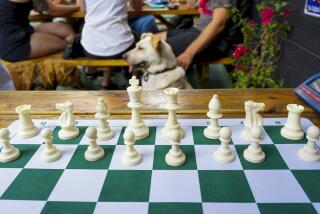Beautiful Mind Meets Match as Computer Ties Chess Champ
- Share via
MANAMA, Bahrain — In the end, world chess champion Vladimir Kramnik was apparently undone by an attribute that separates humans from machines: an appreciation of beauty.
After eight matches, a contest here between the Russian-born champ and a German-made computer program, Deep Fritz, was declared a draw Saturday night. Tied with two victories each and three draws, Kramnik and the computer battled to another draw in what was billed as the tiebreaker in the $1-million “Brains in Bahrain” competition at the Bahrain Mindsports Center, chess headquarters for this Persian Gulf nation.
Chess analysts said Kramnik’s failure to beat Deep Fritz was due to a miscue earlier in the week--a knight sacrifice--that was a thing of beauty to a chess aficionado because of its intricate strategy but that the computer immediately saw as a fatal mistake.
Deep Fritz pounced, and Kramnik’s chances for victory were ruined.
“That’s the weakness of humans: They are seduced by beauty,” said Justin Ricketts, an official of a London-based sports marketing firm that helped promote the match for the kingdom of Bahrain and a British television company.
Frederic Friedel, a founder of ChessBase, the German firm that created Deep Fritz, said the computer’s greatest strength was not its calculating speed but its ability to stay focused.
“Vladimir understands hundreds of times more about chess than the computer,” Friedel said. “But tactically, Fritz is a monster and will always put a human under pressure.”
In Saturday’s match, Kramnik, 27, who dethroned Garry Kasparov two years ago as world champion, played more defensively, seemingly content to tie the computer. In 1997, Kasparov was beaten by the IBM computer program Deep Blue.
Kramnik, at a post-match news conference, said Kasparov lost then because he tailored his strategy to competing with a computer and was playing “a game that was not even chess.” He said he had played against the computer just as he would have against a human opponent.
Kramnik will receive $800,000; the handlers of Deep Fritz, $200,000. The money was put up by King Hamed ibn Isa Khalifa.
If Kramnik had won, he would have received $1 million and the computer nothing. If Deep Fritz had won, the computer company would have gotten $400,000 and Kramnik $600,000.
Enrique Irazoqui, a Spanish chess champion who served as arbiter for the competition, said he thought that Kramnik was done in by the computer’s quick and relentless moves. Deep Fritz also began each game with a different opening.
“I thought Vladimir, with his deep strategy and long-term thinking, was the kind of opponent that a computer would fear most,” Irazoqui said. “But after his blunder, I think he was worn out.”
Kramnik said that the moves he made probably would have beaten humans but that the computer was able to spot flaws.
“I made some mistakes, which is very human,” he said.
More to Read
Go beyond the scoreboard
Get the latest on L.A.'s teams in the daily Sports Report newsletter.
You may occasionally receive promotional content from the Los Angeles Times.








